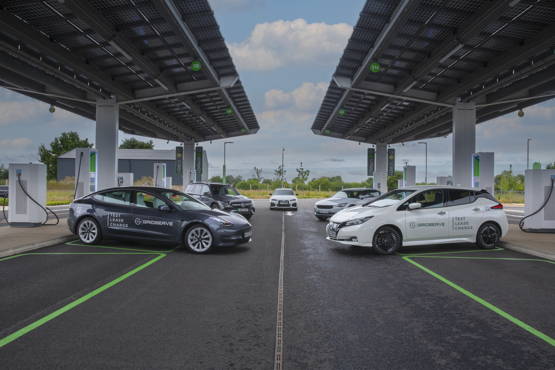Used car retailers have been imposing electric vehicle (EV) stocking bans in a bid to avoid a slump in values as consumers cool on the idea of buying a pre-owned EVs.
Cap HPI described how strong demand for internal combustion-engine (ICE) vehicles accelerated as 2022 came to a close, with values rallying in the more affordable sub-£5,000 and sub-£10,000 categories as consumers continued to feel the impact of the cost-of-living crisis.
A fortnight after valuations director Derren Martin told AM that EV used values were declining four-times faster than their petrol and diesel equivalents, it revealed an average used car value decline of 0.1% at three years and 60,000 miles during January.
But EV depreciation accelerated as the month progressed, with many retailers had imposing “buying bans” to reduce further exposure to faltering stock.
Cap HPI said: “Whilst petrol and diesel vehicles have both experienced small increases at the three-year age point, electric vehicles have seen a dramatic decline, dropping by an average of 6.6% (c.£2,050) in the month.
 “Unsurprisingly, given the retail and trade sentiment, on top of large increases in volumes returning to the market (there has been an 800% increase in the number of used EVs within the sold data received in 2022 compared to 2018), there have been some incredibly large drops in value for many models.”
“Unsurprisingly, given the retail and trade sentiment, on top of large increases in volumes returning to the market (there has been an 800% increase in the number of used EVs within the sold data received in 2022 compared to 2018), there have been some incredibly large drops in value for many models.”
Tesla’s grabbed the headlines, with Model 3 trade values down 10.5% or c.£3,800 in January’s at 12 months old, resulting in an average decline of over 33% (around £13,275) in the past four months.
Model Y values decreased by an average 11.1% (around £5,500) in January, completing a 27% decline (around £14,000) since October.
Among the other hardest-hit EVs, at one-year, were: BMW’s i3, down 9.3% (c.£2,500); the Hyundai Ioniq Electric, down 10.6% (c.£2,400); Jaguar I-Pace, down 10.3% (c.£5,000); Nissan Leaf, down 10.6% (c.£2,400); Audi E-tron, down 8.4% (c.£4,000); and Mini Cooper Electric, down 11.5% (c.£2,900).
 In his mid-month market update for AM, Martin explained that many nearly new EVs were experiencing a pricing correction after being priced higher than their new counterparts due to OEMs’ supply challenges.
In his mid-month market update for AM, Martin explained that many nearly new EVs were experiencing a pricing correction after being priced higher than their new counterparts due to OEMs’ supply challenges.
With lead times now reducing, Tesla new car price reductions and new EV finance offers that make purchase more affordable than many used alternatives, pre-owned EVs are looking less appealing.
Cap HPI said that remarketing centres had averaged an 80% conversion rate for their ICE stock during January had seen the conversion rate for EVs average closer to 20%, stating: “Even these vendors selling the c.20% of cars have had to take some pain on price.”
It added: “Many retailers have introduced buying bans on EV product, with the risk of them sitting on their forecourts for an unpalatable period just too high to buy at almost any price.”
Older, more affordable ICE cars continue to be the most in-demand, meanwhile, as many motorists look to save cash in uncertain economic times.
Cap HPI’s data showed that values increased by 1.5% (c.£100) at five-years-old and at by 3.1% (c.£120) 10-years old.
Cars under £5,000 increased by 4% (c.£120), as £5,000 to £10,000 rose 2.4% (c.£160) and £10,000 to £15,000 1% (c.£115).


















Login to comment
Comments
No comments have been made yet.